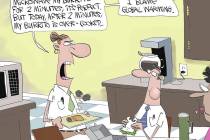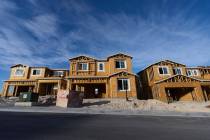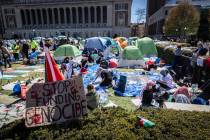Condensing Obama
Barack Obama delivered a poignant and inspiring speech on race in America. He spoke honestly, thoughtfully, bravely, eloquently and with wise and essential nuance.
But his address was lengthy and multi-layered, thus not readily condensed to the defining sound bite of modern mass communication. So please allow me the brazen presumption to attempt to paraphrase and digest what Obama said. Let me try to fit what he spoke into the more pedestrian accessibility of 20 column inches of newsprint.
I'm taking considerable license here. Should I get any of this wrong, Obama is welcome to call or write to correct or clarify. We call that dialogue. It's a good thing. Here goes:
My pastor said some crazy and mean things. I denounce them. But there are two points you need to understand.
One is that he's older than I and comes from a time when black people were kept down less subtly than they are kept down anymore. The comedian Chris Rock once said that white people need to know that the old black man, the one who is quiet and obliging and seemingly kind, probably hates them most of all. There's probably tragic truth in that dark comedy. Rev. Wright, though well over the top at times, gives liberating voice to that kind of suppression and oppression.
I will not throw my friend and pastor under the bus. We need fewer people thrown under buses for the convenience of somebody's political viability. You ask: What are black people so mad about? So I'll tell you.
They've been abandoned and isolated in decaying central cities. Their schools are still segregated and substandard. Their families have been torn apart by the inability to subsist, which has led to a self-perpetuating cycle of poverty and crime. We're not going to get anywhere turning away from that to take whatever satisfaction may come from expressing horror over the shouted words of one angry, grandstand-playing pastor.
The other thing you need to understand is that, in our churches, black people often tend to be demonstrative and emotional. In many cases, that's where we gather to celebrate the higher calling of the Lord while bemoaning the injustices of our temporal existences. I have sat in my church and disagreed with some of what was said while being altogether inspired by the powerful general emotion of what was going on. I can reconcile those. We'll all be better off if we can begin to reconcile them, and not go around all the time in such a mad rush to separate from, and demonize, each other. We're all walking contradictions. We can be different without being divided. That's the very point of America.
I am sympathetic to the concerns of white people who don't think it makes them racist when they move simply so their kids can go to a better school -- or when they move because their neighborhood is becoming crime-infested and less a good financial investment, not because it is changing color.
What we need, then, is an America where my preacher's angriest words are, while reviled and denounced, simultaneously folded into the higher contemplations and aims of a new and broadened national consciousness. We need an America where black people understand and accept the outrage that a man can be acquitted of murder when the evidence indicated powerfully otherwise. And we need an America where white people can understand black celebration that, for once, an American institution, the American power structure, worked to a black man's advantage, even unfair advantage. That's first base. We need to get there. Only then can we begin to navigate together around the bases.
And we need an America where a person can look the way I look and say what I'm saying and get elected president.
That's up to y'all. All I have is the audacity of hope, three wonderful words that -- speaking of complexity and contradiction -- my widely reviled friend and pastor gave me, and all of us.
John Brummett (jbrummett@arkansasnews.com) is a columnist for the Arkansas News Bureau.























